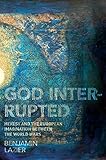God Interrupted : Heresy and the European Imagination between the World Wars / Benjamin Lazier.
Material type: TextPublisher: Princeton, NJ : Princeton University Press, [2010]Copyright date: ©2009Edition: Course BookDescription: 1 online resourceContent type:
TextPublisher: Princeton, NJ : Princeton University Press, [2010]Copyright date: ©2009Edition: Course BookDescription: 1 online resourceContent type: - 9780691155418
- 9781400837656
- online - DeGruyter
- Issued also in print.
| Item type | Current library | Call number | URL | Status | Notes | Barcode | |
|---|---|---|---|---|---|---|---|
 eBook
eBook
|
Biblioteca "Angelicum" Pont. Univ. S.Tommaso d'Aquino Nuvola online | online - DeGruyter (Browse shelf(Opens below)) | Online access | Not for loan (Accesso limitato) | Accesso per gli utenti autorizzati / Access for authorized users | (dgr)9781400837656 |
Frontmatter -- Contents -- Preface and Acknowledgments -- Introduction -- Part One: Overcoming Gnosticism -- Introduction -- Chapter One: The Gnostic Return -- Chapter Two: Romans in Weimar -- Chapter Three: Overcoming Gnosticism -- Chapter Four: After Auschwitz, Earth -- Part Two: The Pantheism Controversy -- Introduction -- Chapter Five: Pantheism Revisited -- Chapter Six: The Pantheism Controversy -- Chapter Seven: From God to Nature -- Chapter Eight: Natural Right and Judaism -- Part Three: Redemption through Sin -- Introduction -- Chapter Nine: Redemption through Sin -- Chapter Ten: Jewish Gnosticism -- Chapter Eleven: Raising Pantheism -- Chapter Twelve: From Nihilism to Nothingness -- Chapter Thirteen: Scholem's Golem -- Epilogue -- Notes -- Index
restricted access online access with authorization star
http://purl.org/coar/access_right/c_16ec
Could the best thing about religion be the heresies it spawns? Leading intellectuals in interwar Europe thought so. They believed that they lived in a world made derelict by God's absence and the interruption of his call. In response, they helped resurrect gnosticism and pantheism, the two most potent challenges to the monotheistic tradition. In God Interrupted, Benjamin Lazier tracks the ensuing debates about the divine across confessions and disciplines. He also traces the surprising afterlives of these debates in postwar arguments about the environment, neoconservative politics, and heretical forms of Jewish identity. In lively, elegant prose, the book reorients the intellectual history of the era. God Interrupted also provides novel accounts of three German-Jewish thinkers whose ideas, seminal to fields typically regarded as wildly unrelated, had common origins in debates about heresy between the wars. Hans Jonas developed a philosophy of biology that inspired European Greens and bioethicists the world over. Leo Strauss became one of the most important and controversial political theorists of the twentieth century. Gershom Scholem, the eminent scholar of religion, radically recast what it means to be a Jew. Together they help us see how talk about God was adapted for talk about nature, politics, technology, and art. They alert us to the abiding salience of the divine to Europeans between the wars and beyond--even among those for whom God was long missing or dead.
Issued also in print.
Mode of access: Internet via World Wide Web.
In English.
Description based on online resource; title from PDF title page (publisher's Web site, viewed 08. Jul 2019)


